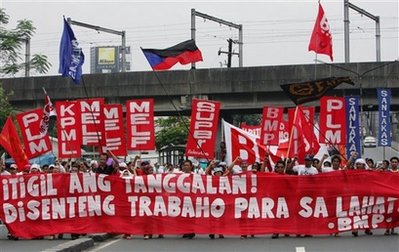From the
link https://www.theage.com.au/world/north-america/wave-of-1000-strikes-ripples-across-the-us-as-crisis-bites-20200929-p5606t.htm
Wave of 1000 strikes ripples across the US as crisis bites
By Chris Zappone
September 30, 2020 — 11.55pm
A wave of more than 1000 primarily unsanctioned, spontaneous strikes has rippled across the United States since the beginning of the coronavirus pandemic fuelled by worker safety fears.
The wildcat strikes have been further propelled by protests against racism following the death of George Floyd in Minneapolis in May.
About 260 walkouts, sick call-ins and industrial actions were recorded between March 1 and May 31, according to the US-based PayDay Report, which tracks the events. The numbers accelerated by another 750 between June and the beginning of September.
Frustration with weak employee protections and low pay in the service industry has prompted staff to walk off the job in protest over safety amid the surge in coronavirus deaths. The death toll in the US has vaulted over 200,000 following a disjointed response overseen by US President Donald Trump.
“We often hear stories of outside organisers getting involved with a group of workers and prompting them to unionise or strike,” said Dean Baker, senior economist at the left-leaning Centre for Economic and Policy Research.
“With this strike wave, the momentum is coming from the grassroots. Workers have decided that they have had enough and are prepared to press for change.”
Racial inequality is linked to concerns about coronavirus worker safety, as COVID-19 has hit black and brown communities harder than white communities.
While black workers comprise 11.9 per cent of all workers in the US, they make up 17 per cent of front-line workers "forcing them to risk their own and their families’ health to earn a living," according to the Economic Policy Institute, another left-leaning research organisation.
The industrial action has ranged from non-union workers at a meat processing plant and fast-food restaurant workers to academics walking out of universities.
In August, schools in Appomattox, Virginia, had to delay reopening as teachers called in sick in an apparent protest against the handling of the coronavirus outbreak.
The same month, employees of the Selma (Alabama) Water Works and Sewer called in sick after being promised a raise in lieu of the hazard pay for coronavirus work that other city departments received. Elsewhere, abattoir workers walked off the job in Indiana. In September, fast-food workers went on strike in Tampa, Florida, and Los Angeles, California.
As protests over the treatment of black Americans flared in the wake of Floyd's death, the motive for the unofficial strikes widened to include racial fairness.
In June, unionised bus drivers refused to transport arrested BLM protesters in Boston. The same month New Mexico State University teachers stopped for a day in a STEM & Academic strike in sympathy with the BLM protests.
University of Oklahoma graduate students this month called a strike to fight systemic racism.
"We want a society that centres on freedom and justice instead of profit and punishment," the announcement from the organising committee said.
The crowd-funded PayDay Report, which covers labour news in the US, has also received a grant from the CEPR. The Strike Tracker is compiled from local media reports through the US.
Some have been organised strikes such as one by nurses at a COVID-stricken rehab centre near Pittsburgh but most are spontaneous, says Mike Elk, the editor of the report.
The figure is actually an underestimation of the total number of strikes, Elk says, “since so many areas of the country don’t have labour reporting”.
In a sign of the extreme situation in the US, the strikes have surged even as joblessness climbs because of the pandemic-triggered economic slowdown. Since the coronavirus hit, 11.5 million workers have been put out of work, while many in the US’s extensive service economy, work in frontline roles exposed to the dangers of coronavirus.
During the crisis, Americans have frequently faced the choice of doing work that exposes them and their family to coronavirus or losing their job.
Baker says the current wave of strikes follows an upswing in unofficial industrial action in 2018 led largely by non-unionised teachers in states controlled by Republicans in a “reaction to ever worsening pay and conditions”.
Statewide public education strikes two years ago saw teachers fed up with low pay and chronic underfunding walk off the job and, in some cases, converge on their state capitol buildings in a show of dissent.
These actions occurred in mainly Republican-held states such as Oklahoma, Arizona and West Virginia.
“Many of these strikes were not organised by unions, but were rather led by an entirely ad hoc leadership group,” said Baker.
The strikes, occurring against a backdrop of dissent in the Trump era, come more than a decade after the global financial crisis helped expose the extent of inequality in the US.
Harrisburg, Pennsylvania-based labour economist Mark Price said they laid bare the “poor pay and working conditions for a whole class of workers deemed essential in a pandemic from nursing home aids to meat packers to grocery workers”.
Despite the scale of the protests, Price says he has a hard time seeing them as an inflection point for industrial relations in the US.
“I have seen no events that would make me believe that worker power is on the rise,” he said.
“There is a lot of misery for sure and that’s the fuel for change. But the spark to light that misery into change hasn’t been lit.”
He says there remains a lack of worker solidarity. “We are a divided society and far too many workers are content to side with employers.”
Price says, however, that the broader trends of inequality and the spread of precarious work in the US are unsustainable.
“It’s hard to predict when those trends will break,” he says.





